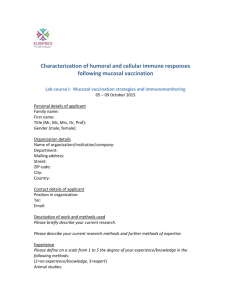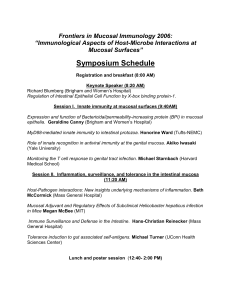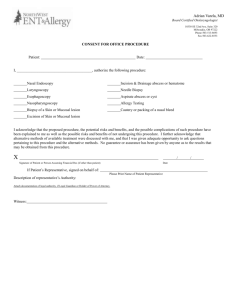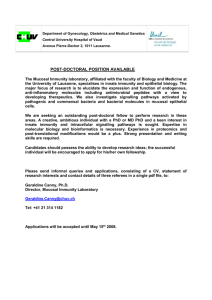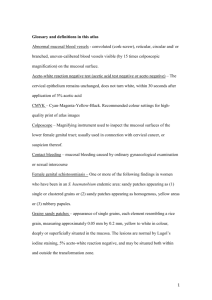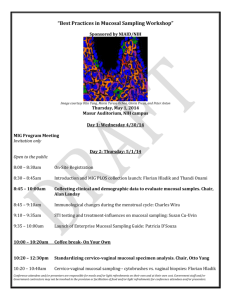Senescence and Immunity in some Arthropathy patients *
advertisement
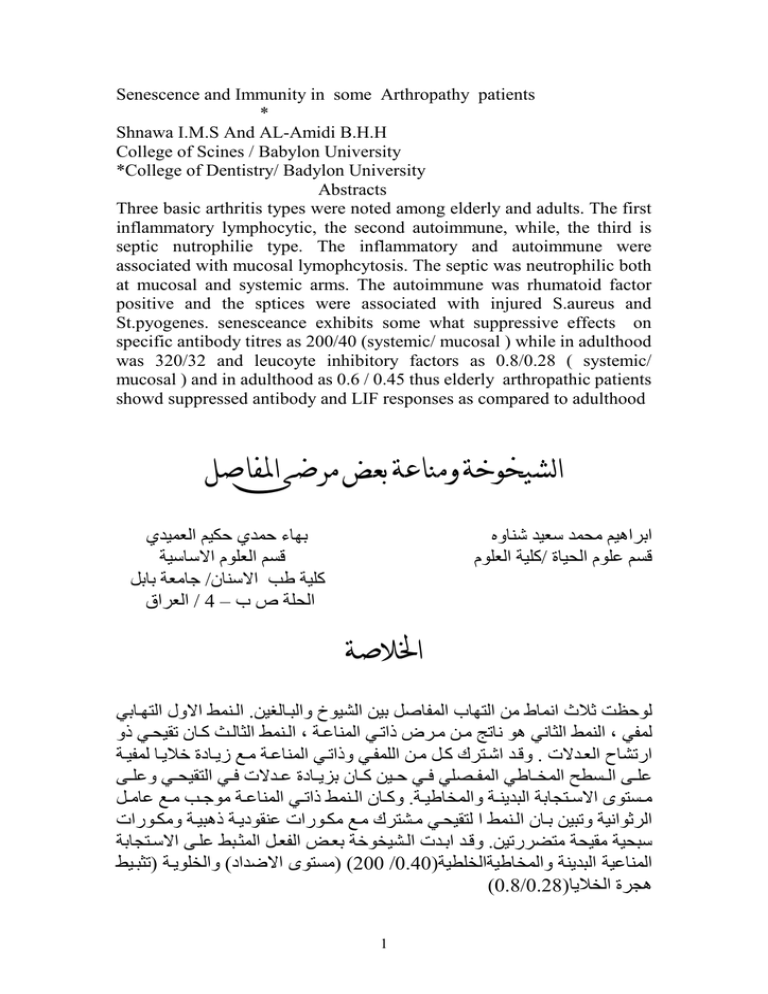
Senescence and Immunity in some Arthropathy patients * Shnawa I.M.S And AL-Amidi B.H.H College of Scines / Babylon University *College of Dentistry/ Badylon University Abstracts Three basic arthritis types were noted among elderly and adults. The first inflammatory lymphocytic, the second autoimmune, while, the third is septic nutrophilie type. The inflammatory and autoimmune were associated with mucosal lymophcytosis. The septic was neutrophilic both at mucosal and systemic arms. The autoimmune was rhumatoid factor positive and the sptices were associated with injured S.aureus and St.pyogenes. senesceance exhibits some what suppressive effects on specific antibody titres as 200/40 (systemic/ mucosal ) while in adulthood was 320/32 and leucoyte inhibitory factors as 0.8/0.28 ( systemic/ mucosal ) and in adulthood as 0.6 / 0.45 thus elderly arthropathic patients showd suppressed antibody and LIF responses as compared to adulthood ﺍﻟﺸﻴﺨﻮﺧﺔ ﻭﻣﻨﺎﻋﺔ ﺑﻌﺾ ﻣﺮﺿﻰ ﺍﳌﻔﺎﺻﻞ ﺑﮭﺎء ﺣﻤﺪي ﺣﻜﯿﻢ اﻟﻌﻤﯿﺪي ﻗﺴﻢ اﻟﻌﻠﻮم اﻻﺳﺎﺳﯿﺔ ﺟﺎﻣﻌﺔ ﺑﺎﺑﻞ/ﻛﻠﯿﺔ طﺐ اﻻﺳﻨﺎن اﻟﻌﺮاق/ 4 – اﻟﺤﻠﺔ ص ب اﺑﺮاھﯿﻢ ﻣﺤﻤﺪ ﺳﻌﯿﺪ ﺷﻨﺎوه ﻛﻠﯿﺔ اﻟﻌﻠﻮم/ ﻗﺴﻢ ﻋﻠﻮم اﻟﺤﯿﺎة ﺍﳋﻼﺻﺔ ϲ ΑΎ ѧϬΘϟ ϝϭϻ ς ϤϨѧϟ ϦϴϐϟΎ ѧΒϟ ϭ ΥϮϴθϟ ϦϴΑ Ϟλ Ύ ϔϤϟ ΏΎ ϬΘϟ Ϧϣ ρΎ Ϥϧ Ι ϼ Λ Ζ ψΣϮϟ ϭΫ ϲ ѧΤϴϘΗ ϥΎ ѧϛ ΚѧϟΎ Μ ϟ ς ϤϨѧϟ ˬ ΔѧϋΎ ϨϤϟ ϲ ѧΗ Ϋ ν ήѧϣ Ϧѧϣ ΞΗΎ ϧ Ϯϫ ϲ ϧΎ Μ ϟ ς ϤϨϟ ˬ ϲ ϔϤϟ ΔѧϴϔϤϟ Ύ ѧϳϼ Χ ΓΩΎ ѧϳί ϊ ѧϣ ΔѧϋΎ ϨϤϟ ϲ ѧΗ Ϋϭ ϲ ѧϔϤϠ ϟ Ϧѧϣ Ϟѧϛ ϙ ήΘѧη Ϊѧϗϭ Ε ϻΪѧόϟ ΡΎ θΗέ ϰѧ ѧϠ ϋϭ ϲ ѧΤϴϘΘϟ ϲ ѧϓ Ε ϻΪѧ ѧϋ ΓΩΎ ѧϳΰΑ ϥΎ ѧϛ ϦϴѧΣ ϲ ѧϓ ϲϠ μ ѧϔϤϟ ϲ ρΎ ѧΨϤϟ τ δѧ ѧϟ ϰѧ ѧϠ ϋ Ϟѧ ѧϣΎ ϋ ϊ ѧϣ ΐ ѧΟϮϣ ΔѧϋΎ ϨϤϟ ϲ ѧΗ Ϋ ς ϤϨѧϟ ϥΎ ѧϛϭ ΔѧϴρΎ ΨϤϟ ϭ ΔѧϨϳΪΒϟ ΔΑΎ ΠΘѧγϻ ϯ ϮΘδѧ ѧϣ Ε έϮѧϜϣϭ ΔѧϴΒϫΫ ΔѧϳΩϮϘϨϋ Ε έϮѧϜϣ ϊ ѧϣ ϙ ήΘθѧϣ ϲ ѧΤϴϘΘϟ ς ϤϨѧϟ ϥΎ ѧΑ ϦϴΒΗϭ Δϴϧ ϮΛήϟ ΔΑΎ ΠΘѧγϻ ϰѧϠ ϋ ς ΒѧΜ Ϥϟ Ϟѧόϔϟ ξ ѧόΑ ΔΧϮΨϴθѧϟ Ε ΪѧΑ Ϊѧϗϭ ϦϴΗέήπ Θϣ ΔΤϴϘϣ ΔϴΤΒγ ς ϴѧΒΜ Η ΔѧϳϮϠ Ψϟ ϭ Ω Ϊο ϻ ϯ ϮΘδϣ (200 /0.40)اﻟﻤﻨﺎﻋﯿﺔ اﻟﺒﺪﯾﻨﺔ واﻟﻤﺨﺎطﯿﺔاﻟﺨﻠﻄﯿﺔ (0.8/0.28)ھﺠﺮة اﻟﺨﻼﯾﺎ 1 Introduction Human life span consist of childhood , aldolesence, adulthood and senescence (1). The humoral and cellular elements for natural and adapted immune responses undergos several changes on aging in comparison to that of youth and adolescant . Some elements are decreasing, others, however, are increasing. Such spectra of increasing and decreasing can be a result of genetic and environmental factors (1, 2). The objective of the present work was at the study the influences of immunoscence on human arthropthy Materials and Methods Nine adolescent and Nine aged arthropathy patients and nine other control subjects. Synovial and blood samples were collected Mucosal immunglobulin was separatd as in (3). Sera were obtained for total serum protein , serum globulin and specific antibody as well as RF test were made (4, 5). LIF was done for peripheral blood and mucosal leucocytes (6). Bacterial culture study was done as in (7, 8). Migration of leucocytes with sensitizar LIF % = X 100 Migration of lecocytes without sensitizer Inhibtion of more than " 30 % is significant.(6) Results I- Synovial fluid; three major types of synoivial fluid were noted as Inflammatory autoimmune and septic (Table -1) II- Aetiology; Bacteria , autoantibody,anti IgG ( RF) and all defined ( Table-I). III- Inflammatory cells; Neutrophilice as in S. pyogenes& St aureus acute arthritis . Lymphocytic responces were evident in those of nonbacterial causes. Mucosal lymphocytosis was 68.4 and higher than these of bacterial arthritis 18.5. Table 1 &2 IV- Mucosal Globulin (MG) & Serum Globulin SG concentrations of aged arthopathy patients was higher than in normal subjects. In patients serum globulin was higher than controls. aged patients were higher than adolescent and youthood. 2 V- Specific antibody ; (table 2, 4) pyogenic acute arthritis rise specific antibodies titer to 320 in blood and 32 at mucosa in adolscent ageing suppresses such titres VI- Autoantibody ; Two sensce and two youthood RF positive cases. VII- Leucocyte Inhibitory factors (LIF) (Table 3 &4), LIF at mucosal surface and peripheral blood were signficant in adolescent and nonsignificat in aged patients . (Table 3, 4). Discussion The human life spane in heath and disease consist of childhood adolescent adulthood and sensence phases (1,9). Thus in any instance of his life one may expect to fined out healthy and diseased adulthood as well as health and diseased senscences subject (10). The major histocompatibilty complex (MHC) and its polymorphic genes experssion products, the human leucocyte antigons (HLA) or major histiompatability molcoules controls,the immune responses, antigen processing antigen presentation and immune recognition (11). The childhood and senscence are mostely associated with reduction of immune reactivity and can be attributed to immune conecting lymph vessels, low number of lymphocyte in lymph nodes or lack of lymph ocyte and macrophages surface receptors (12). While in case of senescent changes may be attributed to ultered elements of natural immunity or ultered elementes of adapted immnuity (13). Since aging is a multifarcous process that affects different individuals in different ways and affects discrete organ systems in distinct ways within same individual. Furthore more, within complex organ systems, different segments or portions of the system may be affected in different rate and to different degrees by aging (1). Aging may affect reduction in antigen uptake antigen processing , antigen precsentation , and immune recognition (14). Lower antibody level seen in senscence patients can be attributed impairment in antigen recognition by Th2 or B cell or low antibodyes synthesis by plasma cell, replinishing effect or increased antibody catabolism (15). Non segnifeant LIF in aged patient(table-1) indicate either of the followings(5,6,11,13) i. Abscances of approperiate sensitizar (inducer) ii. Low synthesis iii. Diminished cytokine production iv. The produced cytokine involved and exhusted to other reactions(16). 3 The noted RF positive case means involvement of an autoimmune responses that can be induced by an autogenic epitope or by bacterial derived epitope having portion of mimicking property to an autoantgen (17). Aging however, may facilitate breaking self tolerance barrier leading to an autoimmune arithritis Higher mucosal and systemic globulin concentration can be due to concamittent environmental exposure to antigen by B lymphocytes or Th2 cells which may ends by polyclonal over production of globulin by plasma cells or due to an inflamatery or infectious process(table-2) (18). References 1- Cohen, H., J.1999 a. Biology and physiology of Aging. American society of Haematology U.S.A., 500-504. 2- Cohen, H.J. Biology of aging as related to cancer. Cancer. 1999b. 74 (suppl.): 720-742. 3- Shnawa ,I.M.S and Alamidi,B.H.H. Med.J. Babylon. 2004, 1(3&4): 4- Garvey, J.S; Cremer , N.E. and Sussdrof D.H 1977. Methods in Immunology 3rd ed Addision Wesley Puplishing company. Massach setts, 517-534. 5- Rose , NR. And Bignzzi, P.E 1980. Methods In Immunodiagnosis. 2nd ed A Wiley – Medical Puplications. John Wiley and sons new york. 6- Soberg,M. Acta. Med.Scand. 1968. 184: 235. 7- Baron, E.J.; Peterson , L.R. and Finglod , S.M. 1994. Baely and Scotts Diagnostic Microbiology 9th ed Mosby- Year Book Ine London, 249-257. 8- Macfaddin J.F. 2000 . Biochemical Tests for Identification of Medical Bucteni 3rd. Lippinocott Williams & Wilkins, London 9- Gerns, D. Hasti Cen. Rep. 2003. 33(4): 31-39. 10Russo, C.; Cherniak, E.p. and Wali, A Proc. Nath Acad. Sci. 1993 90: 11718-11722. 11Caruse, C.; Candore, G. and Romano G.C. Mech. Aging Dev. 2001; 122: 445-462. 12Goodwin, J.S. Nut Rev. 1995. 53(supp): 4-46. 13Hara, H.; Negoro, S. and Miyata, S. Mech. Aging. Dev. 1987. : 38: 245-258. 14High, K.P. clin. Infec. Dis. 1999 28-:717-722. 15Hodes, R.J. Immunal Rev. 1997. 160: 5-15. 16Song, L.; Kim, Y.H.; and Chopra, R.K. Exp. Gerontol. 1993, 28: 313-321. 4 17Knight J.N. Ann. Clin. Lab. Sci. 1995 25: 1-10. 18Walter, D.K.; Banerjec, M. and Mechr R. Biochm. Soc. Trans. 2003, 31: 447-448. 5 Table -1 : Systemic versus mucosal immune response of patient with St. pyogenes Active Arithritis Statistical Features Immune Parameters Mean Median Range Control mean 1.Inflammatry cells 1.1-Neutrophil mucosal Systemic 1.2 Lymphocyte Mucosal Systemic 2. Leucoyte Inhibitory Factor Mucosal Systemic 3. Globulin Mucosal Systemic 4- St.pyogense specific antibody titres Mucosal Systemic 5- Rhumatoid Factor mucosal Rhamatoid Factor systemic 66 73.6 80 73 62-88 71-77 25 64 20.66 21.66 17 20 12-38 21-24 15 37 0.505 0.672 0.6 0.6 0.44-0.82 0.6-0.82 0.96 0.97 1.012 44.978 0.99 45.75 0.46-1.6 0.6-082 0.5 36 36 293.3 - 32 320 - 8-64 80-640 - 0 0 - 6 Table 2: Arthritis types in Elderly and adulthood Senescence Septic Arthritis Autoimm Arthritis Mean Septic Arthritis Autoimm Arthiritis Mean 64.75 73.25% 63 58.66% 63.89 65.9% 19.86 73.75% 56.33 55.33% 38.1 64.54% L 32% 34.33% 28.2% 22.25% 40.33% 31.29% M4% 5 % 4.5% 3 % 3 % 3% E 1.5 % 0 % 0.75% 1 % 1 1% B0 % 0 % 0 % 0 % 0.3 % 0.15% N 81.25% 26.33% 33.79% 81.25% 27 % 54.13% L 18.75% 73.66% 46.2 % 18.75% 73 % 45.87% Parameters System cell count Mean Age Mucosal count Adulthood N % Mucosal Globulin Serum Globulin Total serum protein Agent 0.78 1.58 1.18 0.9 1.2 1.05 42.22 47 44.6 42.22 42.88 42.55 72.97 79.6 76.28 77.17 80.27 79.24 S.aureus / St.pyogens - - RF LIF Titre 0.8/0.78 200/40 + - -/+ S.aureus/ St.pyogen s 0.6/0.45 320/32 7 + - -/+ table 3 Immune parameters in sensanals and Adulthood patient with autoimmune arthritis Se A Differential count/ Differenti q ge systemic al M S Mucosal G G Senesce N L M E B N L nt 1 63 54 37 7 0 0% 37 63 1. 60 % % % % % % 5 6 2 60 51 42 5 0 0% 24 76 1. 46 % % % % % % 6 3 65 71 24 3 0 0% 18 82 1. 35 % % % % % % 6 X 63 58. 34. 5 0 0% 26. 73. 1. 47 66 33 % % 33 66 5 % % % % 8 Adulth ood 60 36 2 1 1% 25 75 0. 48 % % % % % 9 .9 1 56 % 9 1 2 56 52 42 5 1 0% 35 65 1. 32 % % % % % % 8 .3 2 3 57 54 43 2 1 0% 21 79 0. 47 % % % % % % 7 .4 8 4 X 56 55. 40. 3 1 0.3 27 73 1. 42 .3 33 33 % % 3% % % 2 .8 3 % % 8 To 54 56. 37. 4 0. 0.1 26. 73. 1. 44 tal .6 49 33 % 5 1% 66 33 3 .9 M 6 % % % % % 9 4 ea n 8 TS Ag R Ti P ent F tre 82 .0 + - 78 .4 78 .4 79 .6 + - 81 .3 1 + 78 .2 + - 81 .3 1 80 .2 7 79 .9 + - + + - + - + - Seq Table 4 :- Immune parameters in senscnce and Adulthood with septic bacterial Arthritis Age Senceneat N L M E B Differential Mucosal N L 1 2 3 4 X Adulthood 1 2 3 4 X 72 % 74 % 73 % 74 % 73.25% 73 % 23 % 21 % 20 % 21 % 22 % 24 % 4% 3% 5% 4% 4% 2% 1% 1% 2% 1% 1.5% 1% 0% 0% 0% 0% 0% 0% 83% 75% 84% 83% 81.25% 80% 17% 25% 1.6% 17% 18.75% 20% 1.0 0.67 1.0 0.46 0.78 0.99 36.2 38.6 54.0 40.08 42.22 43.9 78.4 70.89 81.89 60.7 72.97 78.3 S. aureus S. aureus St. pyogens St. pyogens 75 % 75 % 72 % 73.75% 22 % 20 % 23 % 22.25% 2% 4% 4% 3% 1% 1% 1% 1% 0% 0% 0% 0% 78% 88 % 80% 81.15% 22% 21% 12% 18.75% 0.57 0.72 1.3 0.9 38.61 46.3 42 42.1 71.00 80 78.8 77.1 S. aureus St. pyogens St. pyogens 63 65 65 66 64.75 39 40 47 38 19.86 Differential count/ systemics 9 MG SG TSP Agent S. aureus
